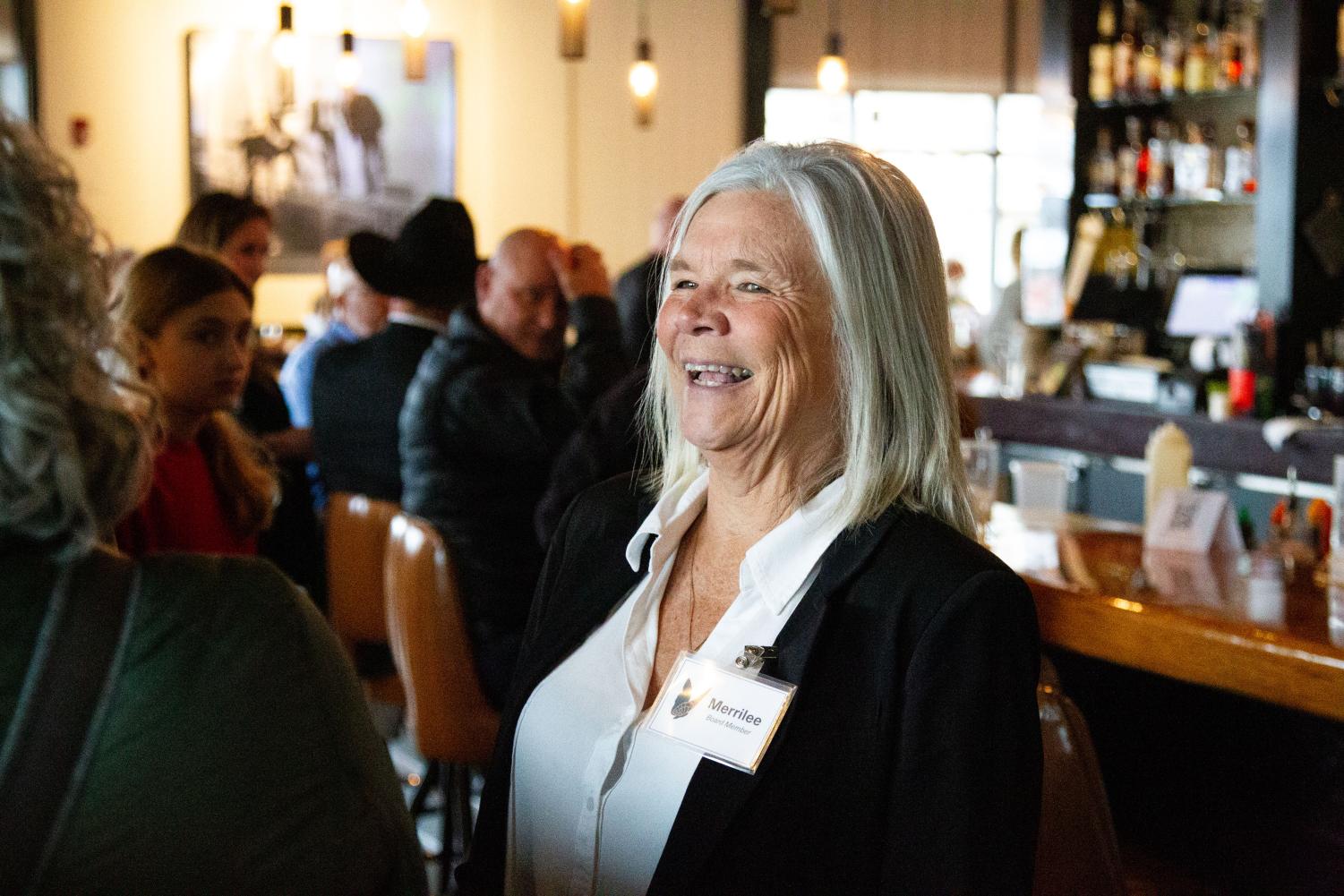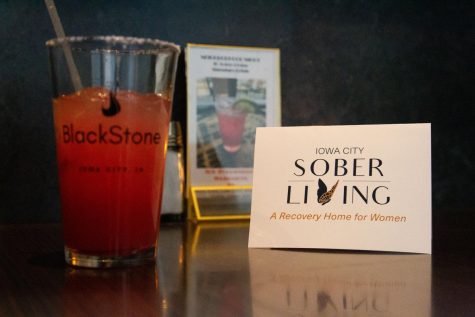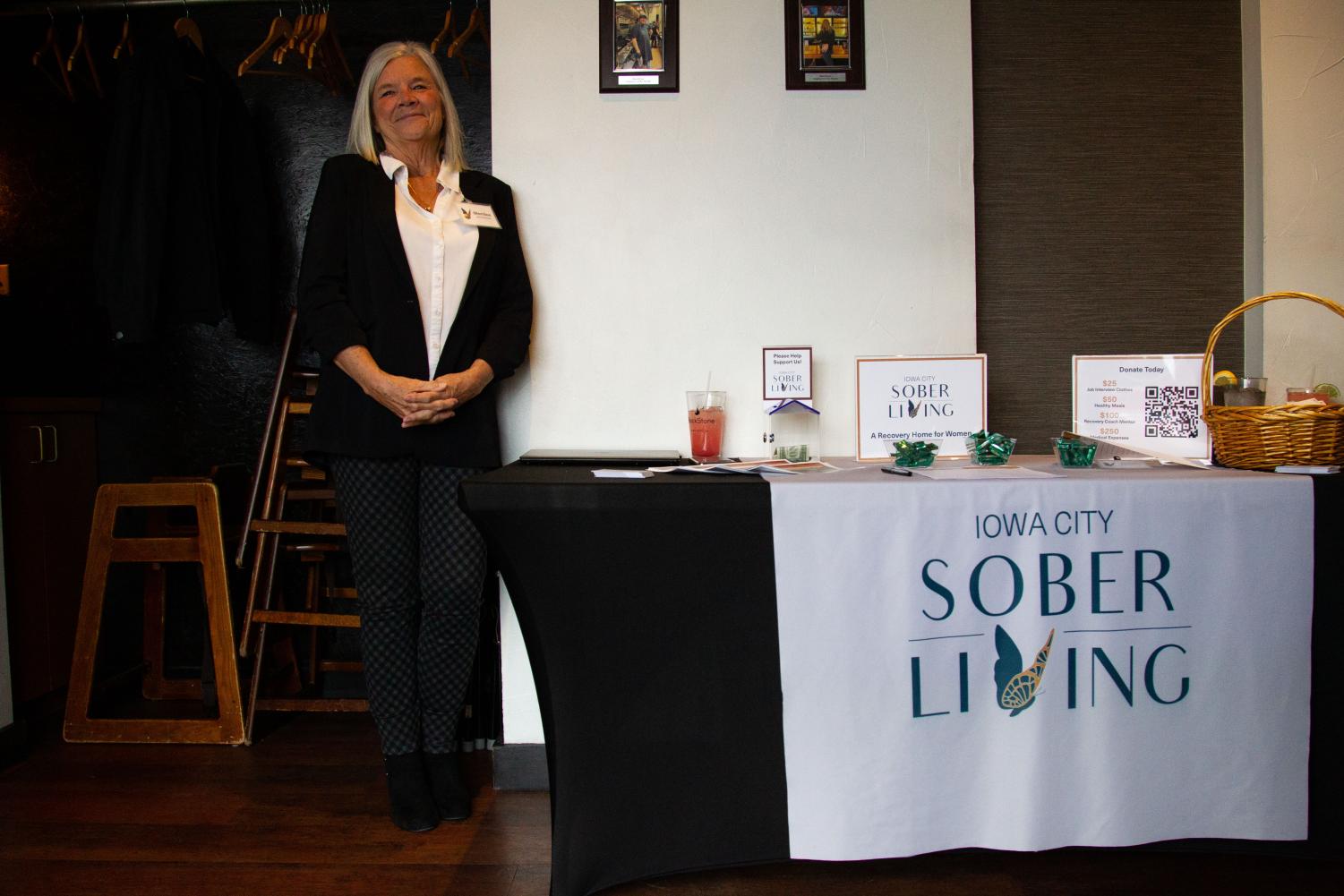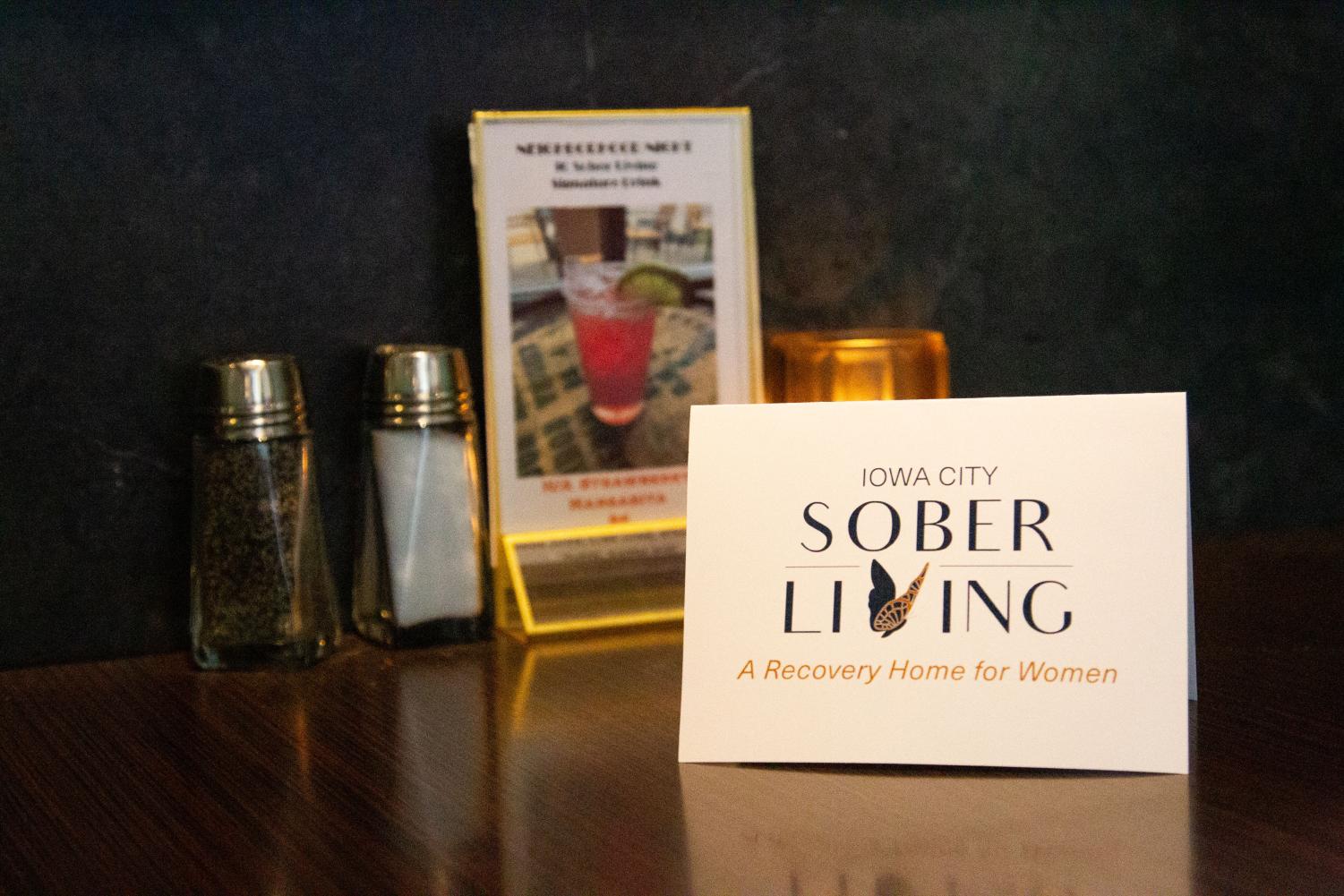Iowa City Sober Living searches for a home
Founded by two nurses in recovery, Iowa City Sober Living will provide a first-of-its-kind supportive space for women looking to recover from alcohol addiction.
April 18, 2023
It started with a road trip from Iowa City to St. Paul, Minnesota, in fall 2020. Sue Gardner invited her friend and fellow nurse in recovery from alcohol use Merrilee Ramsey to visit a residential sober home where another friend was living. The two rented an Airbnb and spent a week engrossed in the culture of sober living. The experience opened their eyes to the possibilities back in Iowa.
“When we were driving home, I looked at Sue, and I said, ‘We ought to do this,’” Ramsey said. “She said, ‘Do what?’ And I said, ‘We ought to do a sober living house in Iowa City.’”
This small talk would eventually turn into Iowa City Sober Living, a registered nonprofit Ramsey and Gardner founded in July 2021. The business partners aim to open a sober living home located in the heart of Iowa City for women recovering from alcohol addiction. Once it opens, the sober home will be the only one available in Johnson County and one of few available for women in the Midwest.
Sober living homes provide people in recovery with a halfway point between rehab and a return to their normal life — a transition Ramsey and Gardner said can reduce the risk of relapse. It also provides support groups, programming, and a community of other like-minded individuals living under the same roof.
A self-described optimist, Ramsey said she hopes to open their doors by July. But before they can invite people into the home, they need to find one — and raise the funds to purchase it.
Ramsey estimated that the cost of a residential home large enough to fit at least eight people will cost $500,000, and the nonprofit is currently raising funds to make a 25 percent down payment. In addition to the down payment, Ramsey said they need to raise money to furnish the home before women can begin moving in. As of March 16, Ramsey said the nonprofit is well over halfway toward meeting its financial goal.
The July open date remains the nonprofit’s goal, but it’s faced with a hard deadline in October when a grant from the Johnson County Housing Trust Fund expires. The grant holders already extended the deadline last year, meaning they won’t receive another chance, Ramsey said.
Defining sober living
To raise money, the nonprofit hosts fundraisers, submits grant applications, and connects with potential corporate sponsors. Convincing people to donate often begins with educating them on what a sober living home does.
“A sober living home is a transition between what we all typically think of as inpatient rehab for substance abuse and the person actually moving back to their pretreatment living environment,” Gardner said. “So, it provides accountability and structure. It places the person in a supportive environment with other women who are also in early recovery.”
Unlike rehab treatment, which is typically covered by insurance plans for 30-60 days and happens in a medical center, sober living treatment lasts anywhere from three to six months and operates out of a residential home.
Insurance doesn’t normally cover residential recovery programs, Ramsey said, but the cost of living at IC Sober Living will be comparable to that of rent in Iowa City, at an estimated $850 a month per person with utilities and internet included. The nonprofit will furnish the home and provide residents with necessities like towels and linens. Two spaces in the home will also be reserved for those with lower income.
The goal of rehab is to help a person recover from the physical craving caused by addiction. For many people, Ramsey said, rehab is not enough time to build the habits necessary for long-term sobriety, and 70 percent of those recovering from alcoholism will relapse at some point, according to the Recovery Village. This relapse rate declines the longer someone remains embedded in a sober community, the same source wrote.
“Even if you can afford to pay for inpatient treatment for 60 days, 60 days is not enough,” Ramsey said. “It didn’t take 60 days to become an alcoholic, so what do you do when you leave treatment?”
Sober homes like IC Sober Living find a compromise between rehab, where residents are confined to the walls of a medical center, and the person’s everyday life, which could be filled with triggers or toxic relationships, Ramsey said.
“At the end of the day, as long as they’re sober, they get to come back in that house and be safe and supported and be with other women in recovery,” Ramsey said. “And it works.”
Women admitted to IC Sober Living are encouraged to stay at the home for up to six months, though Ramsey said it isn’t uncommon for people to leave after three or four months.

A national shortage of sober homes
Residents will sign contracts before they move in promising they will abstain from substance use while staying at the sober home.
Women living in the home will also engage in their community, whether that be through a job, education, or volunteer work. They will also be required to enroll in a recovery program — most often a 12-step program.
Self-care activities like in-house yoga, meditation, book clubs, and pet therapy will also be provided to help residents develop healthy coping habits, Gardner said.
Currently, there are no long-term residential recovery communities for women in Johnson County or most surrounding counties. There are men’s homes in the Quad Cities and in Cedar Rapids, however, which follows the national trend of men’s sober homes outnumbering women’s two-to-one.
The nearest sober home for women in Cedar Riven Have, which operates near the Cedar River in Muscatine County. It’s a 45 minute drive from Iowa City.
Ramsey said Cedar River Haven created its own community, but its remote location makes interaction with the outside world difficult. She added that long-term treatment like that wouldn’t have appealed to her when she was in early recovery, so opening a sober home within an urban area was essential to her.
The nonprofit’s management has considered looking for homes outside Iowa City’s city limits, but Ramsey said the added distance away from jobs, recovery meetings, and the University of Iowa is less than ideal.
Gardner said it isn’t unusual for a place of Iowa City’s size to lack sober living care, but it is desperately needed.
“It’s not just Iowa City we’ll be serving,” Gardner said. “It’s all of eastern Iowa, really, and maybe beyond.”
So far, Iowa City Sober Living has turned down applicants looking for immediate placement in a sober home, and over 20 women are on a waitlist.
Ramsey said she hates turning women away because they lack a house. But the nonprofit’s hunt for a suitable location has been met with obstacles. Some dream homes came with price tags they can’t afford. Other places sold before the nonprofit could raise the funds to place a bid.
The nonprofit identified one home in fall 2022 that Ramsey said was on the historic registry and that had a lot of character. But the location only offered four bedrooms, which would limit the number of women they could take in at a time.
Even if the building the nonprofit ends up purchasing doesn’t make Ramsey melt when she walks in the door, she said they can make it that way once residents fill the home.
IC Sober Living recently identified a woman in recovery herself who expressed interest in working as a live-in house manager once she’s finished with her own program. Having someone further along in their recovery serve as a resident manager can help build trust between the staff and the residents, Ramsey said.
“That’s a huge move because that’s not going to be a fun job,” Ramsey said. “That’s a lot of responsibility.”
The house manager’s role is to facilitate weekly house meetings, organize activities at the house, and ensure the safety of the residents. Ramsey said she will screen all applicants and assist the house manager in the home’s early stages while the manager grows comfortable with the role. Additionally, Ramsey and Gardner will greet new residents and attend events like sobriety celebrations or program graduations.
Combating Iowa City drinking culture
Iowa City has a history of alcohol consumption. A USA Today article from 2021 ranked Iowa City the 31st drunkest city in the nation, a standing measured by the percent of residents who drink alcohol excessively and the percent of fatal car accidents where alcohol was involved. Iowa City isn’t the only city in the state to make it on this list.
Iowa also saw record-breaking liquor sales in fiscal 2022, according to a report from the Iowa Alcoholic Beverages Division. The ABD reported that $431 million worth of liquor was sold in Iowa last year — an increase of around $64 million compared to 2020’s sales.
These sales are spread between liquor stores that sell directly to consumers and bars and restaurants that are licensed to serve alcohol on their premises. Johnson County currently has 235 businesses with active Class C licenses — the designation given to bars and restaurants with permission to serve alcohol to customers. Of those businesses, 129 are in Iowa City.
Found between the liquor stores and clubs in downtown Iowa City is Unimpaired, a dry bar that serves non-alcoholic beverages. From the outside, Unimpaired doesn’t look much different than your standard bar, so much so that former Unimpaired employee Chapis Coronado thought it served alcohol the first time she visited with her family.
“We sit down, and then I remember the server brought menus to me, and I was like, ‘Oh no, I don’t want to drink.’” Coronado said. “I don’t even look at them just because they already looked like regular drinks like cocktails.”

Coronado was several months sober when she visited Unimpaired, which added to her regret when her mother later looked up the menu online and learned that the restaurant only served mocktails.
Soon after this experience, Coronado picked up a job bartending at Unimpaired, where she learned to make the drinks she thought she had to avoid on her first visit.
One of her favorites was a margarita mixed using non-alcoholic tequila. During days when she felt down in the dumps — days where she may have bought an actual drink just a few years ago — the placebo helped her fight off any urges.
“And even though it didn’t get me drunk — because that’s not what I wanted — it made me even more happy that I could drink something that had the taste,” Coronado said.
Beyond the faux drinks, Coronado loved working at Unimpaired because it provided a calm environment compared to other bars, and her kids could attend events like Tuesday night karaoke.
Unimpaired was also Coronado’s first real taste of Iowa City’s sober community. When patrons came in asking for specific brands of non-alcoholic liquor, Coronado knew to ask how long they’d been sober and if they’d be willing to share their story with her. In most scenarios, someone might feel uncomfortable talking about something so personal, but Coronado said Unimpaired’s atmosphere created a sense of trust.
The stories Coronado heard were all vastly different, but she said each came with what she described as their rock-bottoms.
“But everybody’s rock bottom is different,” Coronado said. “Sometimes it can be like mine, where it was just a realization. Sometimes it can be something really traumatic.”
Coronado decided to stop drinking because she said she didn’t want to expose her children to that kind of behavior. She’s maintained sobriety for a year and half, and while it was awkward at first going to parties without drinking, she said her friend group supports her decision. Some even see it as inspiration.
“When they’re around me, they don’t want to drink as much,” Coronado said.
Sometimes Unimpaired sits empty, something Coronado attributed to people’s lack of interest in drinking something that doesn’t get them drunk.
“Everybody just wants to get messed up,” she added.
She envisioned Unimpaired one day becoming a stop on the bar crawls UI students commonly participate in, either at the beginning or at the end so people can sober up.
The UI’s spring 2021 National College Health Survey found that around 82 percent of undergraduate respondents have ever consumed alcohol — almost 14 percent higher than the national average.
Heidi Schmitt, a social worker for the University Counseling Service, serves as co-coordinator of the UI’s Collegiate Recovery Program, which she described as a community that supports students who want to make changes to their substance use.
One example of support provided by the Collegiate Recovery Program is harm reduction education, which are practices like counting and pacing the number of drinks consumed when going out to bars or parties. The Collegiate Recovery Program also provides the Mindful Recovery support group for those looking to abstain from drinking altogether, Schmitt said.
“And then we’re offering recovery ally training,” Schmitt said. “And those are specific trainings to talk about what does it mean to be an ally to someone in recovery or someone who wants to make changes to their substance use.”
This allyship training ties in with other events hosted by the Collegiate Recovery Program as part of April’s Alcohol Awareness Month. Schmitt said she hopes these events will contribute to greater awareness on campus about the Collegiate Recovery Program and other resources available — both for people who know someone with substance addiction and for those who want to change their drinking habits themselves.
“I am positive there are certain students on campus that may not know this exists and that would benefit from it,” Schmitt said. “That’s something we’re working really hard on with social media and marketing.”
Mariah McKenna, a UI third-year student and the health and safety director for Undergraduate Student Government, called students the true voices on campus because they can best explain what drinking culture in Iowa City is like for young people.
“You can see statistics, but the student voice is really important because we actually are talking to each other,” McKenna said. “We’re interacting with one another. We’re going downtown.”
McKenna sits on the university’s Alcohol Harm Reduction Committee, which is composed of students, faculty, and community members and works to decrease high-risk drinking on- and off-campus.
“A big initiative is fraternity and sorority life,” McKenna said. “Kind of, you know, hitting where maybe people want the education, need the education — just to kind of reduce the high-risk areas on campus that may engage in drinking.”
McKenna’s committee also works closely with the UI Department of Public Safety. Students can sometimes be fearful of police, especially when intoxicated, so a student advisory board meets with the department once a month to share these experiences.
McKenna said she advises students to never leave someone alone if they need help or if they’ve had too much to drink. She added that students shouldn’t be afraid to visit the GuideLink Center, which provides urgent substance use care.
“If you can’t handle it, and you think it’s out of your control, never be afraid to contact the GuideLink Center because they’re a great resource to kind of help you get sober,” she said. “They have counselors on site, and it’s just a really great partnership that we’ve been working with.”

The women for the job
Despite Iowa City’s reputation as a drinking destination, Gardner emphasized its lesser-known sober community. The last time Ramsey counted, she said the Iowa City and Cedar Rapids area offered over 200 recovery programs, and she remains active within several of these programs herself.
One advantage to opening a sober home in Iowa City would be its proximity to the UI Hospitals and Clinics. Gardner, who works as a nurse at UIHC, said many staff at the hospital are certified to work with those with substance use disorder.
“Merrilee and I are both nurses,” Gardner said. “I was so thrilled to find out she was a nurse because health care professionals especially have a lot of guilt and shame that goes along with their substance abuse.”
Gardner added that her and Ramsey’s experiences as nurses in recovery make them uniquely qualified to operate Iowa City’s first sober living home. Not only are they professionally trained to provide medical assistance, but they can also empathize with the problems their residents will go through.
Access to a sober living home could have drastically impacted their early recoveries, Gardner said, adding that she’s grateful the two can give the community something they lacked in their own lives.
Not everyone understands alcohol addiction as a disease that can happen to anyone, Gardner said, which leads to stigma that might make it hard to reach out for help.
Gardner was well into her 40s when she developed her addiction to alcohol, she said. At first, she said she was good at hiding it, but eventually, Gardner said her alcohol use left her in what she called a personal crisis.
“You’ve got the world by the tail, you have this wonderful family and home and career, and suddenly, you start indulging in alcohol more frequently than you ever did,” Gardner said. “And then you wake up one day, and it’s like, ‘I can’t go a day without drinking.’”
Ramsey and her husband made a pact that they would only drink on the weekends, she said.
“If you drink every day, that meant you were an alcoholic,” she added, recalling her perception at the time.
Despite this promise, Ramsey said there came a point where she would sneak downstairs to their in-home bar so she could take straight swigs of whatever was available.
Following a drunk driving accident, Ramsey’s husband admitted her to a rehab program at the Abbey Treatment Center in Bettendorf, Iowa. She hasn’t had a drop to drink since, she said.
Ramsey has been sober for five years, and Gardner for three. Even so, they both work on it every day. Ramsey said she still doesn’t know where the key to her husband’s beer fridge is, and she abstains from drinking non-alcoholic liquor as a matter of practice.
Both Ramsey and Gardner said working on IC Sober Living helps them maintain their sobriety.
“One of the cliches that goes along with recovery is that, to keep it, you have to give it away,” Gardner said.
A race to open their doors
In the early stages of IC Sober Living’s development, Ramsey and Gardner developed a tagline for their fundraising campaign: “Open your hearts so we can open our doors.”
The pair continues to write grants and connect with potential donors through events like the community night at BlackStone, a restaurant in Iowa City, on April 3. The nonprofit received 10 percent from all food orders and $1 from the bar’s signature drink made especially for the evening — a non-alcoholic strawberry margarita.
“We’re getting close,” Gardner said. “We’re generating interest. We’ve networked. We have contacts. You know, it’s just a matter of time.”
Gardner and Ramsey individually donated $7,000 in support of the cause, and several members of IC Sober Living’s board have contributed similar amounts.
Though Ramsey recently retired, she picked up hours working part-time as a nurse practitioner doing insurance assessments. Ramsey said she continues to give to the nonprofit, and around half of her earnings go straight to the sober living house.
“This is my baby, and this is my passion, and I want to see it go,” Ramsey said. “To my dying day, I won’t give up on it.”
